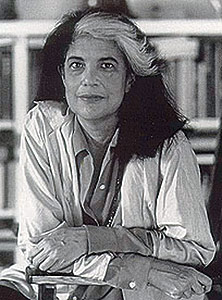Susan Sontag, I really want to like you.
I do! I really do. You get referenced in "La Vie Boheme," you had a torrid love affair with Annie Leibowitz, your body of work spans just about every medium of the English language, you used your words for anti-war activism, and, what's more, you've got that funky gray streak in your hair that someday I hope to rock just like you.
But Susan, what the fuck is this?
(spoiler alert, FYI)
The plot, as you structured it--a man who doesn't feel like he inhabits his life, who kills a man and is not held responsible for it, who falls in love with a blind girl, whose relationship with her becomes obsessive, then reclusive, then self-destructive--enables all these keenly felt, finely written mediations on sight/blindness, living/dying, isolation & loneliness.
But then, as we near the end, everything gets kind of.... bendy... and that's when it hits me. "Oh--man, this is a dream isn't it? Yup. Totally a dream. Damn it, Susan!" and then you have to keep on following him through 10 pages of coffins, knowing you've been had.
I don't know what I was expecting from you, Susan Sontag, but I am pretty sure I was expecting more than "PSYCH!!! HE WAS DEAD THE WHOLE TIME! That whole book was just a suicide hallucination, suckerrrrr!"
And, maybe in 1967 this theme wasn't totally over-exploited and overdone, the modern deus ex machina that it is today--but even so, doesn't making the whole thing fake sort of undermine the really interesting relationships and tensions you worked so hard to construct? And what about the bits where he was dreaming? He was hallucinating bizarre dreams? Isn't that a little redundant? The story up until the end was subtle. I felt cheated. I thought there would be a better explanation.
A story about the problematic unreality of reality had my attention. A story about the unreality of unreality seems, well, obvious.
I really wanted to love it. And I didn't love it. Actually it made me kind of angry.
But I will keep reading you, Susan.
I still like you, and I guess I liked Death Kit, because you do beautiful things with words.

